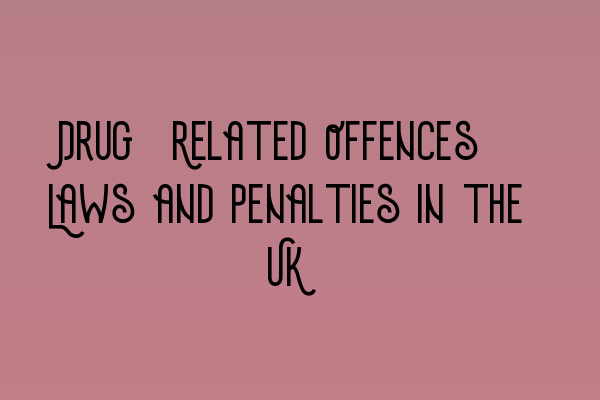Drug-Related Offences: Laws and Penalties in the UK
Welcome to SQE Criminal Law & Practice Law UK, where we provide comprehensive information about the legal system
in the United Kingdom. In this article, we will explore drug-related offences, the laws surrounding them, and
the corresponding penalties in the UK.
Understanding Drug-Related Offences
Drug offences involve the unlawful possession, production, supply, or distribution of controlled substances. The
Misuse of Drugs Act 1971 categorizes drugs into different classes, ranging from Class A to Class C, based on
their potential harm and misuse.
If you are interested in understanding the legal framework in the UK, we recommend enrolling in our SQE 1
Preparation Courses, where you can enhance your knowledge and improve your chances of success in the legal
profession.
Penalties for Drug Offences
The penalties for drug-related offences vary depending on several factors, including the type and quantity of
drugs involved, the purpose of possession, and the defendant’s role in the offence.
Class A Offences
Class A drugs, such as heroin, cocaine, ecstasy, and LSD, are considered the most harmful and attract the
harshest penalties. Possession of a Class A drug can lead to imprisonment for up to 7 years, an unlimited fine,
or both. The intent to supply or trafficking of Class A drugs can result in a life sentence and/or an unlimited
fine.
Class B Offences
Class B drugs, including cannabis, amphetamines, and ketamine, carry lesser penalties compared to Class A
offences. Possession of a Class B drug can lead to imprisonment for up to 5 years, an unlimited fine, or both.
Intent to supply or trafficking Class B drugs can result in up to 14 years’ imprisonment, an unlimited fine, or
both.
Class C Offences
Class C drugs, such as anabolic steroids, benzodiazepines, and GHB, are considered to have the lowest potential
for harm. Possessing a Class C drug can result in up to 2 years’ imprisonment, an unlimited fine, or both. The
intent to supply or traffic Class C drugs can lead to up to 14 years’ imprisonment, an unlimited fine, or both.
If you are looking to specialize in criminal law and practice, our SQE 2 Preparation Courses will equip you with
the necessary skills and knowledge to succeed in this area of legal practice.
Defenses and Mitigation
In drug-related offences, there may be potential defenses and mitigating factors that can reduce the penalties.
These include lack of knowledge or intent, entrapment, duress, and cooperation with law enforcement.
Legal Assistance and Representation
If you or someone you know is facing drug-related charges, it is crucial to seek legal assistance from qualified
criminal defense solicitors experienced in handling drug cases in the UK. Our team at SQE Criminal Law &
Practice Law UK can provide expert legal representation and advice.
To stay updated with the latest SRA SQE Exam Dates and legal news, visit our website regularly. You can also
access SQE 1 Practice Exam Questions and SQE 1 Practice Mocks FLK1 FLK2 to prepare effectively for your
examinations.
To learn more about important dates for the SRA SQE exams, click here.
